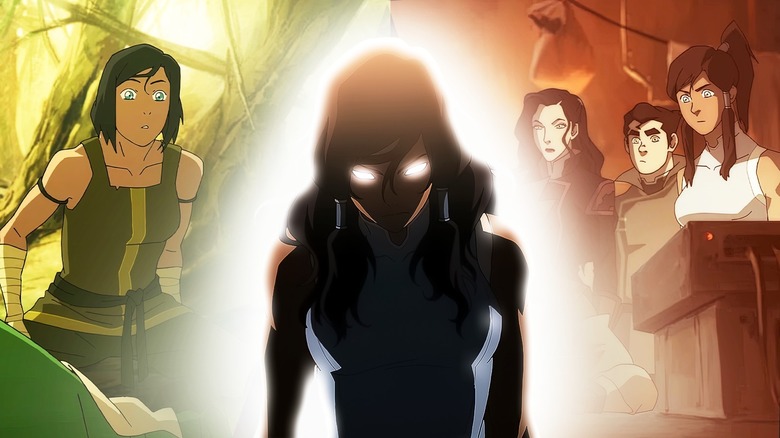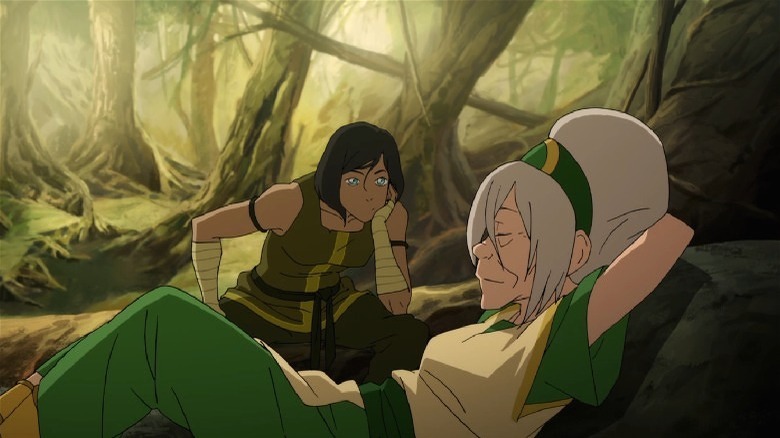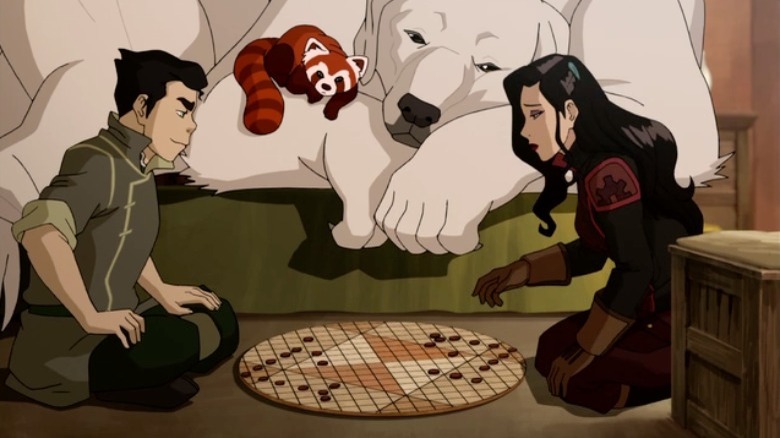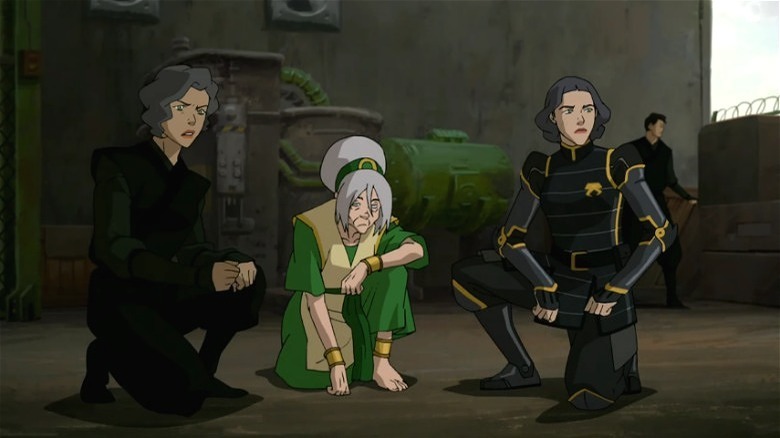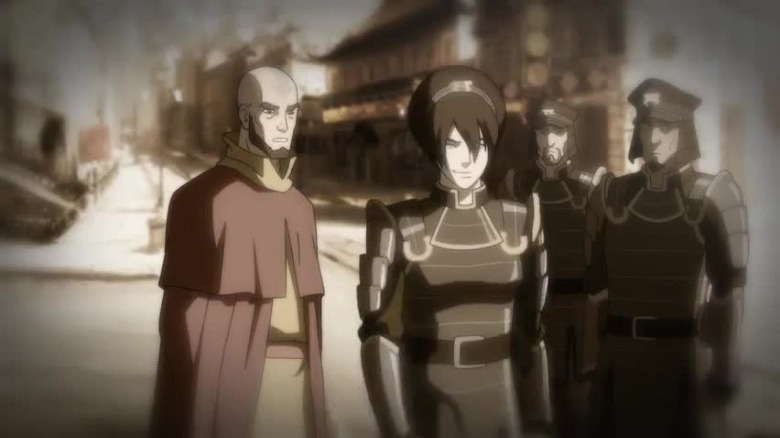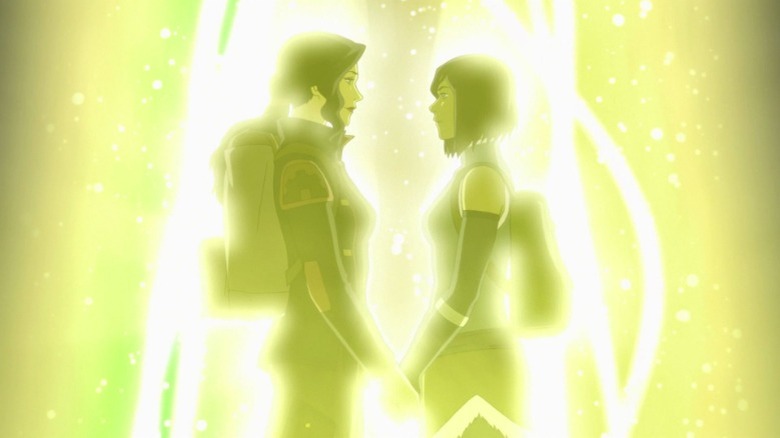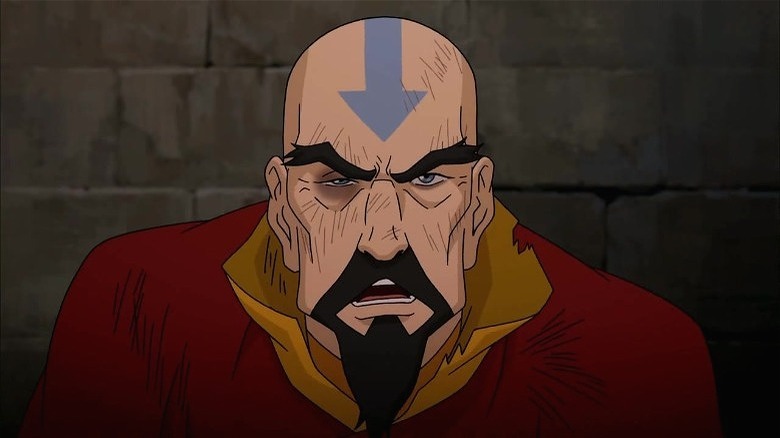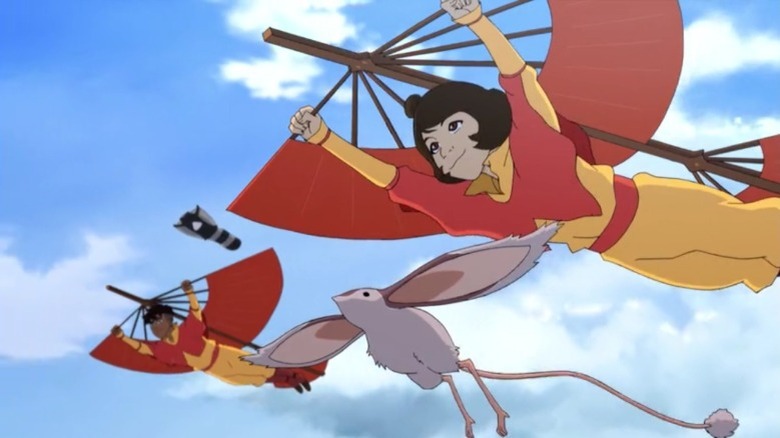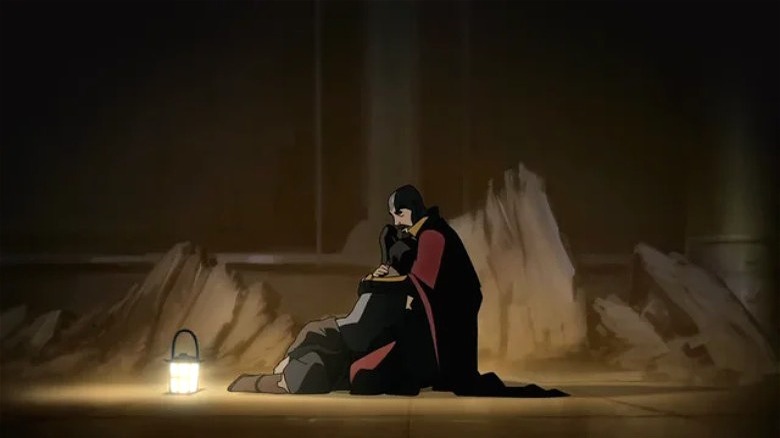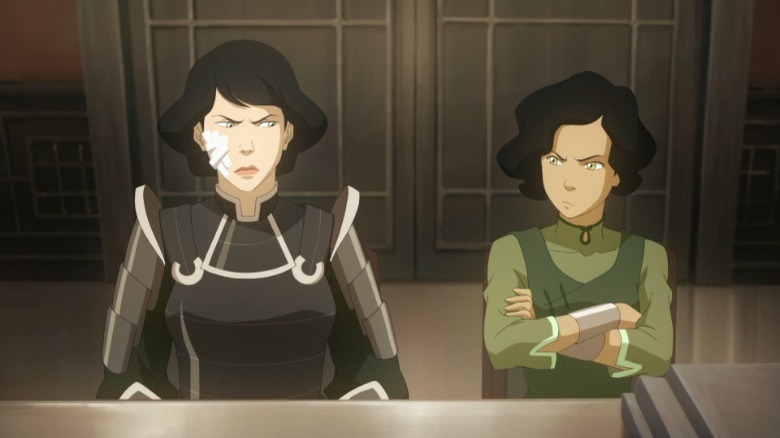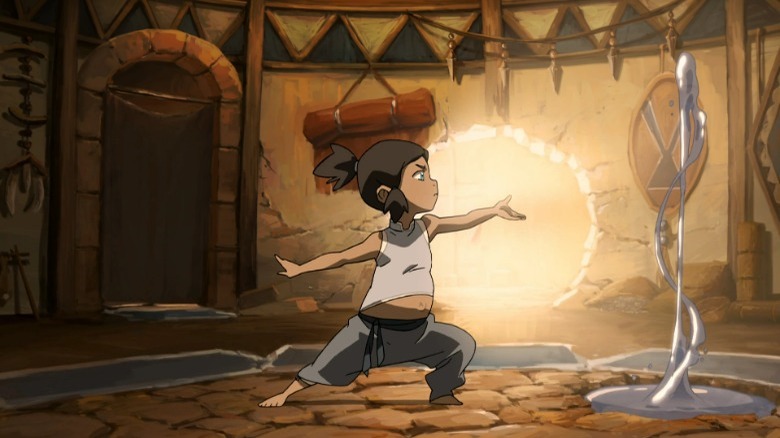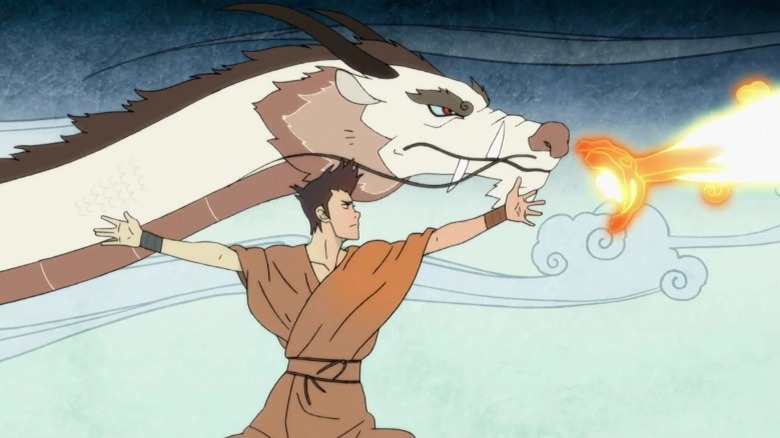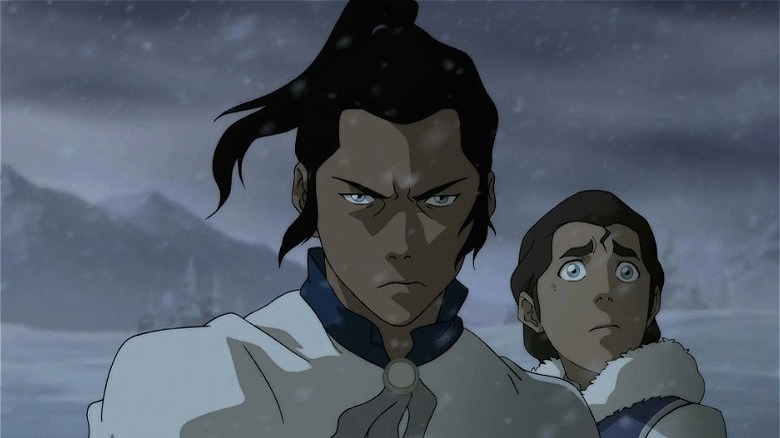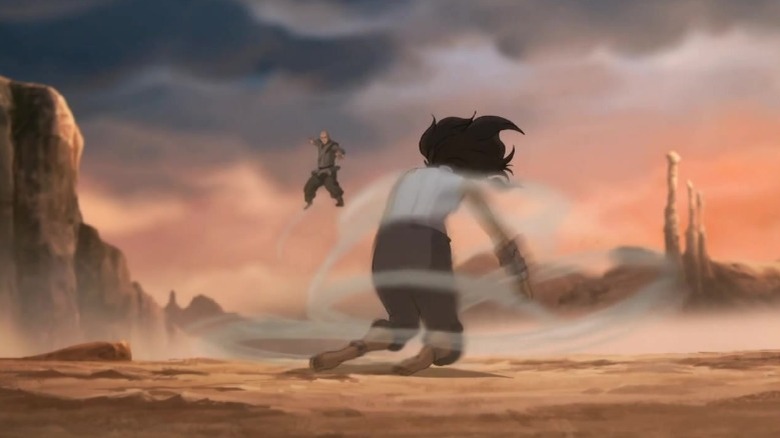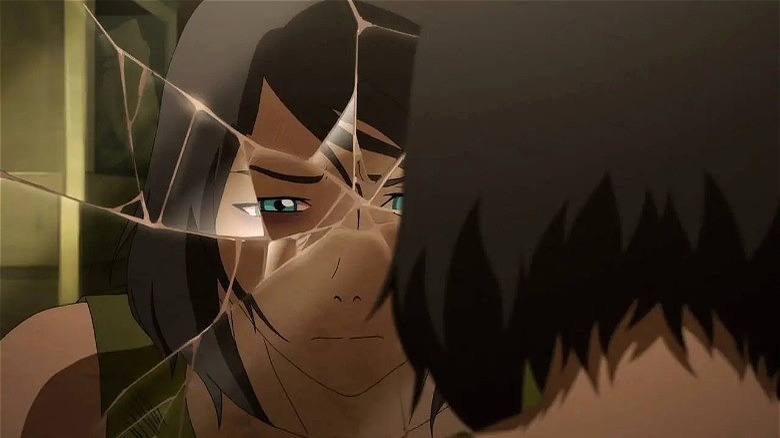The 15 Best The Legend Of Korra Episodes, Ranked
The "Avatar: The Last Airbender" franchise has been experiencing a surge in popularity in recent years, what with the announcement of two different new TV projects and a planned film trilogy, the bouncing of the original series between different streaming homes as a subscription draw, the creation of a Nickelodeon division focused specifically on "Avatar"-related content, and the "Avatar: Braving the Elements" rewatch podcast hosted by Zuko and Korra themselves, Dante Basco, and Janet Varney. Finally, after many years of insufficient cultural and critical attention paid to what's inarguably one of the best and most beloved fantasy TV franchises of all time, it appears that the industry, the press, and the world at large are catching up to the greatness of Michael Dante DiMartino and Bryan Konietzko's creation.
Even so, a lot of that renewed attention has been directed towards "The Last Airbender," with its sequel series, "The Legend of Korra," getting comparatively left by the wayside in fan chatter. But real ones know that "The Legend of Korra" is an excellent show in its own right, and just as deserving of the limelight. Set 70 years after "The Last Airbender" and following the new, Southern Water Tribe-born Avatar who rises after Aang's death, "Korra" was a very different show from "Airbender" in multiple respects. And, as its best episodes attest, those differences made for their own kind of quality television and yielded moments of action, pathos, reflection, fun, and visual grandeur on par with anything in the original series.
15. The Calling (Book 4, Episode 4)
Something of a breather episode amidst the overwhelming barrage of incidents and political intrigue of Book Four, "The Calling" shifts the focus away from the resistance against Kuvira (Zelda Williams) and towards a small group of characters, as they take necessary personal steps towards playing their part in said resistance. Having recently connected with Toph (Kate Higgins) in the Foggy Swamp, Korra experiences harrowing visions of her past foes and realizes she still hasn't let go of them, prompting the earthbending master to take her to the banyan-grove tree for some spiritual enlightenment. Meanwhile, Tenzin (J.K. Simmons) and Pema's (Maria Bamford) kids, Jinora (Kiernan Shipka), Ikki (Darcy Rose Byrnes), and Meelo (Logan Wells), band together to try to track down Korra — a task that proves more daunting than expected for the typically hyper-proficient Jinora.
Although it's a crucial episode in the arc of Season 4, one that finds Korra finally ridding herself completely of the poison in her system and rejoining the world after three years of incognito life, "The Calling" demonstrates that "The Legend of Korra" made the best use of the episodic format when it gave its characters more room to breathe. In addition to being the "Korra" episode that finds the Air Temple kids at arguably their most vivid and charismatic — Ikki, in particular, is an unexpected MVP — it also spins out one of the show's most-winning dynamics in the Korra-Toph two-hander, which flows from dry comedic exuberance to heartrending emotional profundity with an effortlessness that only this franchise could pull off.
14. Turning the Tides (Book 1, Episode 10)
Every late-season stretch on "The Legend of Korra" ramps up the stakes vertiginously, and Book One is no exception. "Turning the Tides" stands as an especially illustrative instance of that kind of pivot because we get to see it in real time within the episode. While the early going is slower-paced and quieter, focusing on the domestic dynamics that ensue while Korra is recuperating in Air Temple Island after escaping Tarrlok's (Dee Bradley Baker) imprisonment, it doesn't take long for the other shoe to drop — or should I say shoes, plural. The entire United Republic Council gets kidnapped! And the Equalists launch a mecha tank attack on Republic City! And aircraft encroach on Air Temple Island! And Pema goes into labor!
Given the number of plates being spun, it's remarkable that the episode manages to hang together at all, let alone that it gathers everything into one of the most propulsive and nail-biting installments in "Korra" history. The grand, imposing physicality of the Equalists' hostile takeover is matched by some first-rate bending on the part of virtually every main player, all of which is animated with the series' typical mind-boggling panache and woven together with laudable attention to rhythm and clarity. As if all that were not enough, "The Calling" is essentially the Lin Beifong (Mindy Sterling) Power (Half-)Hour — and seeing her do her thing so mightily, right before losing it all in an unforgettable act of self-sacrifice, is just about all I could ask for from this show.
13. The Stakeout (Book 3, Episode 9)
After the "CSI"-esque investigation of "The Terror Within," which ends with the revelation that Suyin Beifong's (the late Anne Heche) adviser Aiwei (Maurice LaMarche) has been working as an informant for the Red Lotus, "The Stakeout" keeps up the procedural antics. The episode follows Team Avatar as they venture into the Earth Kingdom in search of Aiwei, and eventually engage in a stakeout in the luxurious Misty Palms Oasis in hopes of listening in on his meeting with Zaheer (Henry Rollins).
If there was a weakness that consistently plagued "The Legend of Korra," it was the relative weakness of the new Team Avatar, both as an ensemble and as a group of individual characters, compared to their iconic "The Last Airbender" counterparts. While Korra herself was always an incredibly well-rounded protagonist, the writers often had trouble fleshing out Mako (David Faustino), Bolin (P.J. Byrne), and Asami (Seychelle Gabriel) beyond the most basic and prescriptive of personality traits, and even more trouble making them bounce off each other in compelling ways — such that the show would often get bogged down in hamfisted relationship drama. "The Stakeout" offers a glimpse into an alternate world in which "Korra" always had as firm a grip on its core characters as its predecessor; from the investigation's satisfying displays of teamwork to the delightful Pai Sho game between Asami and Bolin, to Mako actually showing some sense for once, it's an episode that recaptures that vintage "Avatar" feeling of hanging out with a group of old friends who happen to be heroes.
12. Operation Beifong (Book 4, Episode 10)
The Beifong clan takes center stage in "Operation Beifong," the episode that immediately precipitates the climax of Book Four. "Operation Beifong" follows Opal (Alyson Stoner), Lin, and Bolin as they travel to Zaofu to rescue Suyin and the rest of the Beifongs from imprisonment, leading to an unexpected reunion between Lin and her long-estranged mother, Toph. Meanwhile, surprise season highlight Zhu Li (Stephanie Sheh) attempts to sabotage a spirit energy-powered cannon she's been building for Kuvira, but her gambit goes south.
In addition to being a classic "Legend of Korra" helping of high-octane action (how about that Suyin vs. Kuvira metalbending fight!), "Operation Beifong" spotlights the best-written, most fascinating in-group dynamic in the whole series — namely, that between the various headstrong members of the Beifong family and their immediate associates. Lin and Toph haven't spoken in 20 years, and the episode doles out the details of their falling out patiently and smartly, with a truly impressive level of grit and realism for supposedly kid-oriented television — including a casual, offhanded reference to the fact that Lin's father was just a random guy with whom Toph "didn't really work out," unceremoniously quashing years of misguided fan theories. Add to that the large quantities of texture both comedic (e.g. Lin's dismissal of Bolin as "an actor," Toph's refusal to be called "mother" by Jim Meskimen's Baatar) and dramatic (e.g. Baatar Jr.'s [Todd Haberkorn] crisis of conscience, Opal and Bolin's slow reconciliation), and the absolute badassery of Zhu Li's double heel turn, and you've got a top-shelf "Korra" episode.
11. Out of the Past (Book 1, Episode 9)
Sometimes, nothing beats a good dose of nostalgia. All things considered, the first season of "The Legend of Korra" shows an admirable degree of restraint in the way it doses the glimpses into the "Last Airbender" characters' adult lives, especially considering it was originally intended as the show's only season. "Out of the Past," however, is largely structured as an opportunity to see the Gaang in action one more time. And it's pretty much impossible to resist.
The episode finds Korra under Tarrlok's imprisonment, trying to meditate her way out of a tight spot like any good Avatar must do now and then. As the rest of the cast scrambles to find her, Korra allows Avatar Aang to reach out to her through visions of his own past. The visions in question drive home the point that the Avatar's duty is never finished: As it turns out, Aang (D.B. Sweeney), Toph, and Sokka (Chris Hardwick) — the latter still as quippy and boomerang-obsessed as ever, bless his heart — once had to deal with a ruthless waterbending crime lord who possessed the ability to bloodbend without moving his body, and whose actions may still be finding repercussions in the ongoing Equalist conflict. The present-day timeline moves with the characteristic zippiness and forward propulsion of Book One, including an incredible and unexpected face-off between Amon (Steve Blum) and Tarrlok. The flashbacks, meanwhile, smartly avail themselves of the affection we all have for these characters to make a cogent point about history's cyclical nature.
10. The Last Stand (Book 4, Episode 13)
"The Legend of Korra" could always be trusted to serve up a strong season finale, so it stands to reason that the finale of the entire show would be one of its most memorable episodes. The second half of an action-packed two-parter, "The Last Stand" finds Team Avatar breaking apart Kuvira's giant mecha suit from the inside. But the meat of the episode is what ensues after that: Kuvira escapes haphazardly into the Spirit World, Korra gives chase, and the season's central heroine and villain have a direct one-on-one confrontation that segues shockingly from bending to bonding. Ultimately, the Avatar proves her might not by defeating her nemesis in combat, but by convincing her to surrender willingly.
While "The Last Stand" lacks the benefit of functioning as a payoff to an entire series' worth of plot the way "Sozin's Comet" did, it still manages to put a highly satisfying bow on the trajectory of Korra as a character, and take stock of all the major changes the show's world went through over the course of four seasons. Korra's conversations with Kuvira, in the thunderous climax, and Tenzin, in the meditative aftermath, are filled with the kind of complexity and emotional maturity that always set the show apart. And, perhaps most importantly of all, this is the episode that, in an unprecedented move for kids' TV, officially confirmed a romantic relationship between Korra and Asami — to the joy of millions of Korrasami shippers the world over.
9. The Ultimatum (Book 3, Episode 11)
There's intense, and then there's "The Ultimatum." Book Three is an exceptionally well-paced season of television on the whole, but it was in Episode 11 — the last before the two-part finale — that it really snapped into focus we were watching something utterly exceptional. And the reason it's such a gut punch is that this is the one where, to put it succinctly, everything goes absolutely wrong.
Initially following the gang as they scramble to come together amidst the Earth Kingdom's Red Lotus-imposed chaos, the episode takes a dramatic turn at the halfway point. Team Avatar and the Zaofu government finally manage to contact the Air Temple via radio to warn Tenzin of Zaheer's impending attack, but the warning comes too late: The Red Lotus descends upon the temple like a tempest, and, following the most barn-burning 10 minutes of action in all of "Korra," they manage to subdue and imprison every last member of the new Air Nation.
It's a sight that boggles the mind even as it unfolds: Disaster, despair, and hope repeatedly reached for and then brutally quashed. This is the episode that establishes the Red Lotus as the greatest threat the United Republic of Nations has ever faced, with a power so terrifying it can scarcely be understood. Paradoxically, it's also the episode that establishes Tenzin — fearless, indefatigable, fighting to the last of his strength — as not just the self-evident heart of the series, but the greatest combat airbender in "Avatar" history.
8. Original Airbenders (Book 3, Episode 7)
One of the reasons why Book Three was the strongest season of "The Legend of Korra" is that it had the firmest grip on the episodic storytelling format. Sure, the overarching Red Lotus plot, with its relentless forward motion and its barrage of complex moral and physical altercations between Korra and Zaheer, was gripping. But every episode of the season also told its own rewarding mini-story that contributed to the whole without just feeling like connective tissue, as exemplified by "Original Airbenders."
Coming just before the ramping-up of stakes in Book Three's final stretch of six episodes, "Original Airbenders" steps away from the season's main arc to focus on the other world-changing event taking place concurrently with it: The formation of the new Air Nation. With Team Avatar off in Zaofu, the plot focuses on Tenzin as he attempts to train the newly-found airbenders who have joined him at the Air Temple.
It's an opportunity for the series to indulge in some classic "Avatar" comedic zaniness, with an increasingly aggravated Tenzin facing an uphill battle to get an army of casuals to understand Air Nomad mores and philosophies. In addition to just being thoroughly entertaining, amusing, and adorable — so many baby bison! — and making mighty contributions to the franchise's world-building and the developments of Jinora and Kai, the episode recaptures that feeling of character-driven, tonally freewheeling exuberance that "The Last Airbender" offered at its best, and that "Korra" didn't always find time or space for.
7. The Voice in the Night (Book 1, Episode 4)
It's kind of stunning how many elements we take for granted as intrinsic to "The Legend of Korra" took a while to be properly introduced. For instance, it was not until Season 1, Episode 4 that Asami Sato entered the picture — by hitting Mako with her motorcycle, no less. But the amount of table-setting going on during "The Voice in the Night" — also including the introductions of Hiroshi Sato and the United Republic Council, including Councilman Tarrlok — is not really the most memorable part of this episode.
There's an argument to be made for this as the single most underrated episode of "Korra," and what makes it so great is the premature confrontation that occurs between Korra and Amon, not just the fact that it happens, but the way the show chooses to handle it. Still her brash and impulsive self from early in the show, Korra opts to brush off her apprehension towards the Equalists and publicly challenge Amon to a one-on-one duel, which he accepts, only to subdue her with a battalion of chi-blockers and announce that she'll be the last person whose bending he'll take away. Few shows would have the guts to depict their main heroes in the state of abject, overwhelming terror and despair that Korra is left in at the end of the episode, but that emotional honesty — the sheer weight of Korra's fear — is what renders her entire journey throughout the season so powerful.
6. Old Wounds (Book 3, Episode 6)
Here's another example of a Book Three episode that achieves an especially high degree of storytelling acuity by downplaying plot and focusing on the human element. As character-developing episodes go, "Old Wounds" is particularly rewarding — arguably the most rewarding such episode, in fact, save for #1 on this list — because it turns its gaze entirely to Lin Beifong, a character who established herself from the beginning of "Korra" as one of the ensemble's most compelling figures alongside Korra herself and Tenzin, yet wasn't always afforded the same amount of exploration.
"Old Wounds" follows Lin as she undergoes acupuncture to restore the balance in her chi, and finds herself revisiting all the baggage that made her the hardened, skittish, emotionally repressed person we know. As such, this is the episode where we get to know all about Lin's beginnings, as well as the decades-long particulars of her conflict with Suyin. There's no heroism or villainy to be found in the episode's flashbacks to the sisters' youth, just the deeply-felt complexity of two people responding honestly to the world and to each other. By visualizing the past so vividly, "Korra" enriches the present, deepening both Suyin and Lin as characters, and bringing context to the latter's relationship with Korra — whom, it turns out, Lin subconsciously sees as a proxy for her sister's rebellious teenage self. When Lin finally achieves catharsis, it feels crucial for the show as a whole; such is the beauty of well-done character development.
5. Welcome to Republic City (Book 1, Episode 1)
Few things can do more for a show than a good pilot. If ever there was an episode that reaped rewards from the frenzied and on-the-fly narrative modus operandi of "The Legend of Korra," it was the very first episode, which gave "Avatar" fans so much novelty, excitement, innovation, and promise at such a breakneck pace that the ensuing season of TV was almost set up to underwhelm by comparison.
This is, after all, the episode on which we get our first dip into the brave new world of the "Avatar" franchise as modified by a 70-year shift in time. For those who have been with "Korra" since the very beginning, it's impossible to forget the sheer rush of seeing the way things had changed: Peace! Modernity! Electricity! Dieselpunk aesthetics! Republican government! As a feat of world-building, "Welcome to Republic City" can scarcely be topped.
But world-building is not all there is to it; the first "Korra" episode is also laden with storytelling choices that make it a sensationally compelling series intro. Korra's characterization as a young hothead who's slipped into an almost forceful hero persona after years of single-minded training is both totally logical and entirely disarming as a protagonist introduction, and the social tensions that gave rise to the Equalist movement are teased out rather brilliantly. It all feels like watching the franchise reach a new level of understanding about itself and its own possibilities — exactly what you want from a sequel.
4. Beginnings (Book 2, Episodes 7 and 8)
More than arguably any "The Legend of Korra" episode, "Beginnings" is the one installment that gets consistently and near-unanimously singled out by fans as a high point in the entire "Avatar" franchise — not just because of its strength as an individual two-parter, but because of its sheer momentousness as an act of mythological expansion. It's in these two episodes that we get to learn, alongside Korra, about the Avatar's — ahem — beginnings as an entity, by reaching all the way back to the story of the very first master of all four elements: Avatar Wan, who lived 10,000 years before Korra ... and had the voice of Steven Yeun.
Charting his entire trajectory from impoverished food pilferer to firebender to exile in the Spirit Wilds, "Beginnings" demonstrates how Wan came to befriend the spirits and become a human bridge between the two worlds, eventually merging with Raava (April Stewart), the ancient spirit of light and peace, to become the Avatar. Although Wan's conflict with Vaatu (Jonathan Adams), the spirit of darkness, ultimately proves relevant to the (rather underwhelming) civil war plot of Book Two, it's the self-contained magic of "Beginnings" that makes it such a singular and iconic moment in "Avatar" history. From the gorgeous ink-on-parchment animation style to the Homeric sweep to the plethora of callbacks and affectionate nods to the lore of both "Korra" and "Aang" — finally some clarification about the whole "lion turtles or dragons?" debacle — this is the rare hour of television that immediately feels timeless.
3. Skeletons in the Closet (Book 1, Episode 11)
The struggle against the Equalists comes to a head in "Skeletons in the Closet," the second-to-last chapter of Book One. With Republic City overtaken and United Republic forces as yet unable to take back the capital, a large portion of the episode follows Team Avatar's final-hour preparations to take on Amon directly and put an end to the war. What's really interesting and memorable about "Skeletons in the Closet," however, is the revelation of Amon's past — as told by an imprisoned Councilman Tarrlok, who turns out to be his brother.
Sitting in an all-metal holding cell, Tarrlok tells Korra and Mako about how he and Amon — real name Noatak — grew up as the sons of Yakone (Clancy Brown), the bloodbending perp whom we saw get tried by the United Republic in "Out of the Past." After having his bending removed by Avatar Aang, Yakone became dead-set on revenge, and roped both Noatak and Tarrlok into his maniacal obsession. Through an extended, grueling, gut-wrenching flashback, the entire plot of Season 1 is thrown into relief, as it becomes clear that both of the season's rivaling villains were being driven by their respective responses to profound, unfathomable familial trauma. It's the saddest singular story told in any episode of "The Legend of Korra," and it serves to both raise the stakes and deepen the perspective as the series accelerates toward its originally-intended conclusion; would that we'd gotten some more seasons to delve into such a fascinating character dynamic.
2. Venom of the Red Lotus (Book 3, Episode 13)
Given how much momentum Book Three builds in its back half, approaching its conclusion as it originally aired felt to some fans like waiting for the whole thing to end with an inevitable, ugly screech. But the season finale doesn't just maintain the previous episodes' level of intensity; it straight-up delivers the most excitement, entertainment, and emotion the franchise has managed since "The Last Airbender" — or ever, as some would argue.
From a straightforward, plot-minded perspective, "Venom of the Red Lotus" is the strongest episode of "The Legend of Korra." No other half-hour in the show's history packs so much gripping action, grand drama, character progression, visual splendor, and seismic narrative development into its running time; it's the kind of dizzying, mind-blowing, expletive-inspiring Great TV that shows like "Game of Thrones" and "Lost" offered at their best. With all the season's plots — the new Air Nation, the Beifong reconciliation, Bolin's lavabending apprenticeship, Jinora's rise to airbending master — converging into a final, embittered, all-or-nothing stand against the Red Lotus, the episode offers a degree of catharsis that would be plenty enough to land it on any list of all-time great season finales. But it's the ultimate showdown between Korra and Zaheer — and the drastic, unimaginable outcome it has for our heroine — that really sets it apart. And it's no coincidence that the best episode of the entire show would come one season later, as a direct consequence of that showdown.
1. Korra Alone (Book 4, Episode 2)
It all boils down to this: One young woman, burdened with greater trauma and more pressing responsibilities than anyone could comprehend, gradually coming to terms with herself and her duty to the world. Say what you will about "The Legend of Korra," but its greatest strength — the richness, complexity, and evolution of its heroine — is undeniable. As such, there's no other option for the title of best "Korra" episode; it has to be the one that sidesteps plot, sidesteps myth, sheds all obligations of epic action-fantasy storytelling, and considers Korra as nothing but a human being.
To witness a character once so driven, so sure of herself and her power, in the state of abject despair and confusion she's in throughout "Korra Alone" is staggering enough; the episode reaches a new understanding of Korra by placing her at her uttermost psychological limit, much like "Airbender" once did for the likes of Zuko (Bruce Davison) and Azula (Grey DeLisle). Even beyond the sheer emotional blow, though, this is an all-timer episode because it may be the single greatest, most honest, and most sobering depiction in TV history of the toll that's part and parcel of being the world's savior. By the end of it, nothing is resolved, the pain from Zaheer's poison still lacerates, and Korra is only at the beginning of her healing journey. But she has taken the most important step, which is to face herself at her lowest — and keep going. What a character, what a show.
